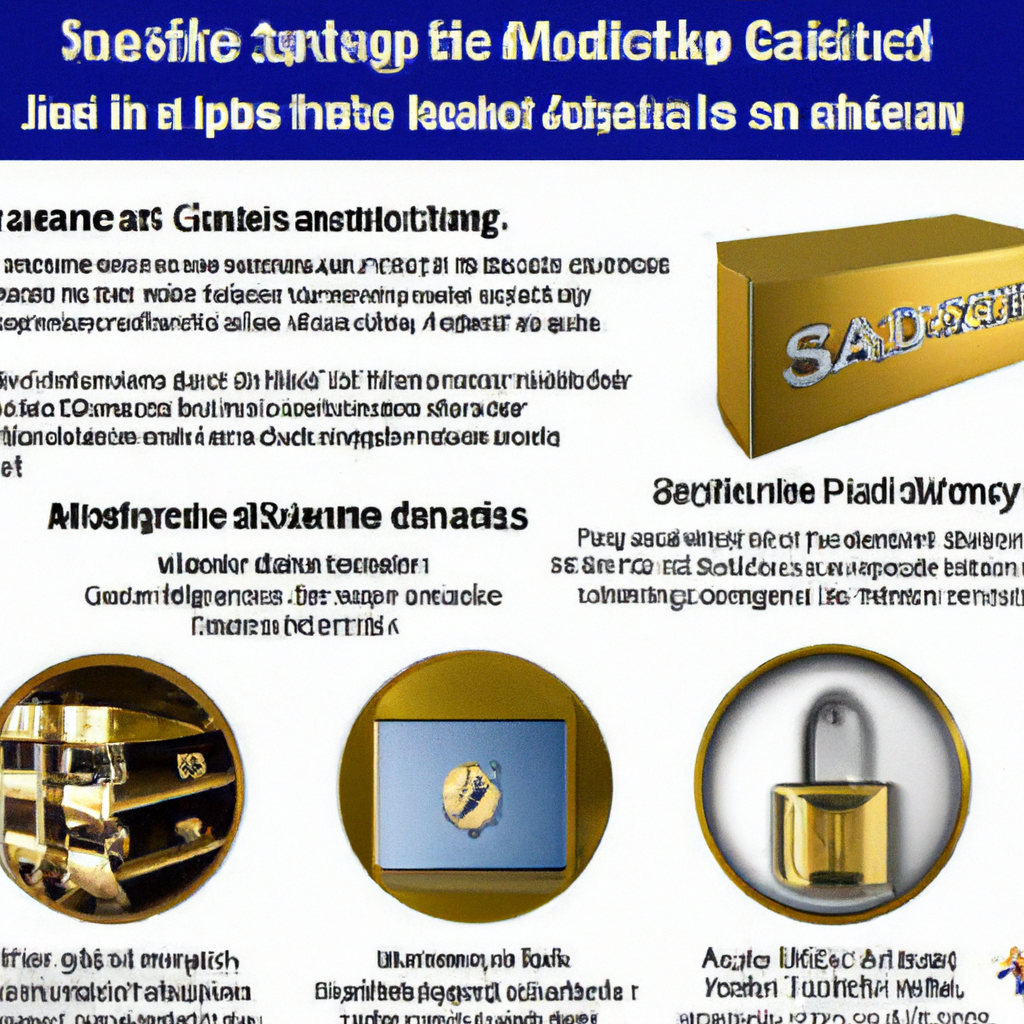Are you considering investing in gold in Malaysia? If so, you might be wondering about the storage options available to keep your precious metal safe. In this article, we will explore the various storage options for gold investments in Malaysia, giving you the information you need to make an informed decision. Whether you prefer storing your gold at home, in a bank vault, or using a third-party storage facility, we’ll discuss the pros and cons of each option. Let’s dive in and discover the best storage solution for your gold investments in Malaysia!

Self-Storage Options
Safe Deposit Boxes in Banks
When it comes to storing your gold investments, one of the first options that may come to mind is a safe deposit box in a bank. Many banks offer this service to their customers, providing a secure and convenient location to store valuable items like gold. Safe deposit boxes are typically located in the bank’s vault, which is designed to provide maximum security.
Keeping your gold in a safe deposit box ensures that it is protected from theft and unauthorized access. Banks have strict security measures in place, including surveillance cameras, 24/7 monitoring, and access restrictions. Additionally, the vaults are often fire and flood-resistant, giving you peace of mind that your gold will be safe even in the event of a disaster.
Private Vaults
Aside from safe deposit boxes in banks, another self-storage option for gold is private, independent vaults. These specialized facilities are specifically designed to store valuable assets, including gold and other precious metals. Private vaults offer secure storage options with enhanced security features and protocols.
Private vaults are often equipped with state-of-the-art security systems, such as biometric access controls, high-resolution surveillance cameras, and secure transportation procedures. Some private vaults even have additional measures like iris scanners and fingerprint recognition to ensure only authorized individuals can access the storage area.
Home Safe
If you prefer to have direct access to your gold investments, storing them in a home safe is an option worth considering. Home safes come in various sizes and levels of security, so you can choose one that fits your needs and budget. It is important to invest in a high-quality safe that is resistant to fire, theft, and tampering.
When storing gold in a home safe, it is crucial to keep its location discreet and limit access to trusted individuals. You should also consider installing security systems, such as alarm systems and surveillance cameras, to further protect your valuable assets. Additionally, be sure to check with your insurance provider to ensure that your gold is adequately covered in case of theft or damage.
Third-Party Storage Facilities
Secure Vaults
In addition to private vaults, there are third-party storage facilities that specialize in secure storage for gold and other valuable assets. These facilities often offer a range of storage options, including individual secure vaults and segregated storage for larger quantities of gold. With third-party storage facilities, you can benefit from their expertise in asset protection and security.
Secure vaults provide advanced security measures to ensure the safety of your gold investments. They have stringent access controls, extensive surveillance systems, and round-the-clock security personnel. Additionally, third-party storage facilities often have insurance coverage for stored assets, providing an extra layer of protection.
Precious Metals Storage Services
Several companies specialize in providing storage services specifically for precious metals like gold. These companies understand the unique requirements for storing gold and offer secure and insured storage options. Precious metals storage services often have facilities in strategic locations, ensuring accessibility and ease of transport.
These storage services typically offer various options, including allocated storage, where your gold is held separately and identified as yours, and unallocated storage, where the gold is held on a collective basis. Precious metals storage services prioritize security, employing cutting-edge technology to protect stored assets. They also offer services like regular inventory audits and insurance coverage for stored gold.
Offshore Storage Options
International Banks
For those looking for additional diversification and offshore storage, international banks can be a viable option. Many international banks offer secure storage facilities that adhere to strict security protocols and regulations. Storing gold offshore can provide geographical diversification and potentially offer protection against political and economic instability.
International banks often have state-of-the-art vaults with robust security systems to protect stored gold. They may also provide added services like account management and regular reporting, ensuring transparency and convenience. It is important to consider legal and tax implications when choosing offshore storage options, as regulations may vary across jurisdictions.
Private Vaults
Similar to domestic private vaults, there are also private vaults available offshore that specialize in secure storage for gold. These vaults can be located in countries known for their strong financial systems and stability. Offshore private vaults offer an additional layer of diversification and can be an attractive option for those concerned about domestic geopolitical risks.
Offshore private vaults prioritize the security of stored assets, employing advanced technology and strict access controls. They often offer comprehensive insurance coverage and may have additional services like transportation and asset management. It is essential to thoroughly research and choose reputable offshore private vaults to ensure the safety and accessibility of your gold investments.
Gold Storage through Gold Investment Companies
Gold Investment Accounts
Gold investment accounts offered by reputable gold investment companies can provide a convenient way to store and manage your gold investments. These accounts allow you to buy and sell gold without physically owning and storing the metal. Instead, the gold is held and managed by the investment company on your behalf.
Gold investment accounts offer benefits such as liquidity, ease of trading, and professional management. The investment company handles the storage and security of the gold, ensuring it is stored in secure facilities. It is important to choose a reputable gold investment company with a proven track record and reliable storage practices.
Gold-backed Cryptocurrencies
Another innovative option for storing gold investments is through gold-backed cryptocurrencies. These digital currencies are backed by physical gold stored in secure vaults. By investing in gold-backed cryptocurrencies, you indirectly own a portion of the physical gold reserves held by the cryptocurrency issuer.
Gold-backed cryptocurrencies combine the benefits of digital currencies, such as ease of trading and global accessibility, with the stability and tangibility of gold. The physical gold backing adds an extra layer of security to the cryptocurrency. However, it is crucial to thoroughly research and choose reputable gold-backed cryptocurrencies to ensure the validity of the underlying gold reserves.

Insurance for Stored Gold
Importance of Insurance
Insurance is an important consideration when storing your gold investments, as it provides protection against potential risks and losses. While secure storage facilities and reputable institutions take steps to ensure the security of stored gold, unforeseen events can still occur. Having adequate insurance coverage can provide financial protection and peace of mind.
Insurance for stored gold can cover various risks, including theft, damage, and natural disasters. It is essential to thoroughly review the insurance policies and coverage offered by storage facilities or investment companies. Consider factors such as the coverage limits, exclusions, and the reputation of the insurance provider.
Choosing an Insurance Provider
When selecting an insurance provider for your stored gold, there are several factors to consider. Look for insurance companies with experience and expertise in insuring valuable assets, such as gold. Consider their reputation, financial strength, and track record in handling claims.
It is also important to review the insurance policy terms and conditions in detail. Understand the coverage limits, deductibles, and any exclusions that may apply. Additionally, confirm the process and requirements for filing a claim, as well as the timeline for claim resolution. Choose an insurance provider that offers comprehensive coverage and responsive customer service.
Considerations for Gold Storage Options
Security
When choosing a gold storage option, security is paramount. Consider the security measures in place at the storage facility, such as access controls, surveillance systems, and personnel. Look for vaults that are resistant to theft, fire, and other risks. Additionally, reputable storage options often have insurance coverage for stored gold, providing an added layer of protection.
Accessibility
Consider the accessibility of your gold investments when selecting a storage option. If you anticipate needing regular access to your gold, options like safe deposit boxes in banks or home safes may be more suitable. On the other hand, if you prioritize security and long-term storage, third-party storage facilities or offshore options may be more appropriate.
Cost
The cost of gold storage can vary depending on the option you choose. Factors that can impact the cost include the size of the storage space or box, the level of security provided, and additional services offered. It is important to weigh the cost against the value of your gold investments and consider it as part of your overall investment strategy.
Location
The location of the storage facility is another factor to consider, especially if you prefer to have physical access to your gold. Choose a storage option that is conveniently located and easily accessible. If you opt for offshore storage, consider factors such as political stability, legal frameworks, and ease of transport.

Legal and Regulatory Aspects of Gold Storage in Malaysia
Laws and Regulations
Before storing your gold investments in Malaysia, it is crucial to understand the applicable laws and regulations. Malaysia has specific regulations regarding the storage and trading of gold to ensure transparency and investor protection. Familiarize yourself with these regulations to ensure compliance and avoid any legal issues.
The relevant laws and regulations in Malaysia may include licensing requirements for storage facilities, reporting obligations, and taxation rules. It is advisable to consult with legal professionals or experts in gold investment to ensure a comprehensive understanding of the legal framework.
Tax Considerations
Taxation is an important consideration when storing gold in Malaysia. The tax treatment can vary depending on factors such as the type of gold investment, storage location, and duration of storage. Consult with tax advisors or professionals who specialize in gold investments to understand the tax implications and ensure compliance with tax laws.
It is also important to consider the potential impact of international tax regulations if you choose to store gold offshore. Each jurisdiction may have its own tax rules, and it is crucial to understand and comply with these regulations to avoid any legal complications or penalties.
Alternative Storage Options
Safety Deposit Boxes in Airports
Some airports offer safety deposit boxes that can be used to store valuable items, including gold. This can be a convenient option if you frequently travel or have a need for accessible storage near airports. However, it is important to carefully assess the security measures in place at the airport, as well as any additional costs or restrictions.
Shipping and Delivery Services
If you prefer to have your gold investments physically in your possession, shipping and delivery services can be an option. However, it is important to use reputable and secure shipping services to minimize the risk of loss or theft. Consider using services that offer specialized packaging, tracking, and insurance coverage for valuable items.
When using shipping and delivery services, it is important to ensure compliance with applicable regulations and customs requirements. Familiarize yourself with any documentation or permits that may be needed, and consider the potential risks involved in transporting valuable items.

Storing Gold at Home
Security Measures
Storing gold at home can provide direct access and control over your investments. However, it is crucial to take proper security measures to protect your gold from theft or damage. Invest in a high-quality home safe that is specifically designed for storing valuable assets like gold. Choose a safe that is resistant to fire, burglary, and tampering.
In addition to a secure safe, consider enhancing home security measures such as alarm systems, surveillance cameras, and strong doors and windows. Limit access to the safe to trusted individuals, and avoid disclosing its location to minimize the risk of theft.
Insurance Coverage
When storing gold at home, it is important to review your insurance coverage. Confirm with your insurance provider that your homeowner’s insurance policy adequately covers your gold investments. If necessary, consider adding a separate rider or policy specifically for valuable items such as gold.
Insurance coverage for stored gold can provide financial protection in the event of theft, damage, or loss due to covered perils. Review the terms, limits, and exclusions of your insurance policy to ensure that your gold investments are appropriately covered.
Disadvantages
Storing gold at home has certain disadvantages that must be considered. One of the main drawbacks is the increased risk of theft compared to storing gold in secure facilities. Even with security measures in place, homes may be more vulnerable to burglary or break-ins.
Another disadvantage is the lack of professional storage and management services that are available with third-party storage options. Storing gold at home requires self-management and organization. Additionally, storing large quantities of gold may be challenging due to space limitations and the added security requirements.
Conclusion
When it comes to storing your gold investments, there are several options to choose from. Each option comes with its own advantages, disadvantages, and considerations. Whether you opt for self-storage options like safe deposit boxes or private vaults, utilize third-party storage facilities or offshore options, or explore alternative methods such as gold investment accounts or home storage, it is crucial to prioritize security, accessibility, cost, and location.
Consider the legal and regulatory aspects of gold storage in Malaysia, including laws, regulations, and tax considerations. Evaluate the insurance options available to protect your gold investments in case of unforeseen events. By carefully considering and selecting the most suitable storage option for your gold, you can ensure the safety and security of your valuable assets.









